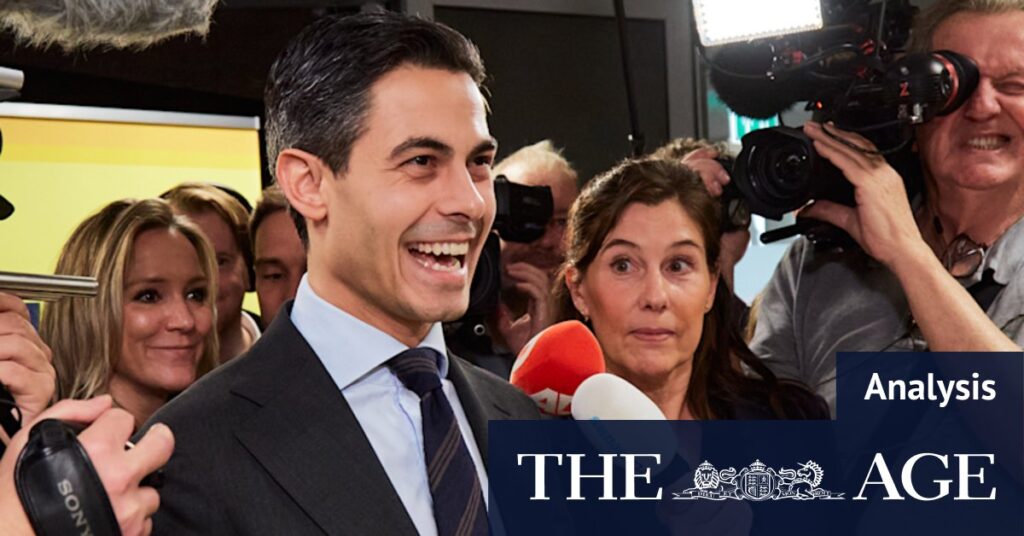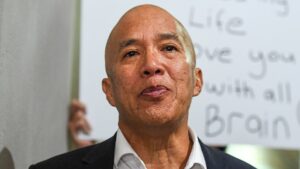
London: In a stunning turn of events, Rob Jetten, leader of the centrist Democrats 66 (D66), has emerged as the biggest winner in the Dutch elections, effectively halting the rise of the far-right. The election results have positioned Jetten as a strong contender for the role of the Netherlands’ next prime minister, as he prepares to negotiate a likely coalition government.
The victory marks a significant setback for right-wing populist Geert Wilders, whose Party for Freedom (PVV) saw a dramatic drop in support. Wilders, known for his hardline stance on immigration, had hoped to capitalize on the election to increase his influence, but instead, his party’s seats fell from 37 to 26.
Jetten’s Campaign and Promises
Rob Jetten, a former railway manager with a constant smile, successfully lifted his party’s representation from nine to 26 seats. His campaign resonated with voters through promises to invest in education and tackle climate change, encapsulated in the optimistic catchphrase, “Het kan wel” or “It is possible.”
If Jetten ascends to the prime ministership, he would not only be the youngest to hold the position but also the first openly gay prime minister of the Netherlands. This personal milestone is underscored by his engagement to Argentine hockey player Nicolas Keenan, with plans for a wedding next year that could capture international attention.
The Fall of Geert Wilders
Geert Wilders, who triggered the election by withdrawing from the coalition government in June, aimed to leverage his hardline immigration policies to gain ground. His platform included halting asylum claims for four years, withdrawing from the UN Refugee Convention, and ending family reunification programs. Despite these efforts, Wilders acknowledged on Thursday that he would not be part of the next government, though he remains a significant parliamentary figure.
“It’s time that I take a step back and transfer the lead of our movement to the next generation,” said Frans Timmermans, leader of the Green Left and Labour Party alliance, acknowledging their own electoral setback.
Political Landscape and Coalition Challenges
The election results underscore the fragmented nature of Dutch politics, with five major parties vying for dominance and ten smaller ones playing potential coalition roles. In a parliament of 150 seats, no single party can govern alone, necessitating alliances that may include several smaller parties to achieve the 76-seat majority required.
Despite D66’s successful election, the path to forming a government remains uncertain. Negotiations are set to begin next week, and while Jetten’s party has gained momentum, it cannot yet claim the prime minister’s office.
Implications for Dutch Politics
Jetten’s triumph against Wilders represents a broader rejection of fear-driven politics. His campaign, characterized by positivity and inclusivity, echoes sentiments used by leaders such as Australia’s Prime Minister Anthony Albanese, who also described himself as a “progressive patriot.”
“I want to defeat Wilders with hope, with energy and with the power of togetherness,” Jetten declared in a social media post, emphasizing a shift from fear and division to unity and progress.
As the Netherlands navigates its political future, the election results highlight the challenges of forming a stable government in a deeply divided political landscape. The next steps will depend on the coalition negotiations and the ability of parties to bridge ideological divides.
Meanwhile, the concerns about migration that Wilders amplified remain prevalent across Europe, suggesting that while his party may have faltered, the debate over immigration policies is far from over. The Dutch elections have set a precedent for centrist politics, offering a potential roadmap for other nations facing similar political dynamics.





